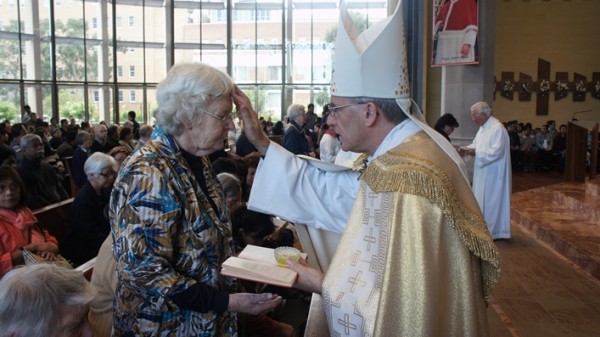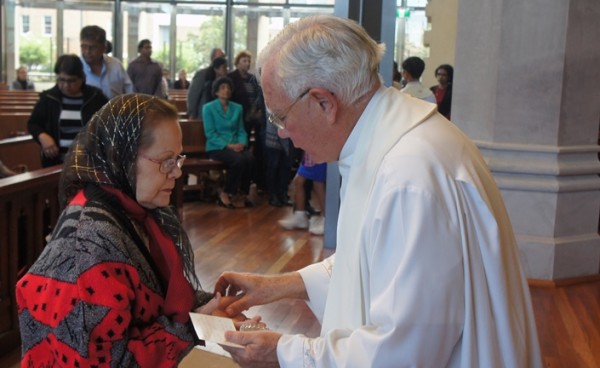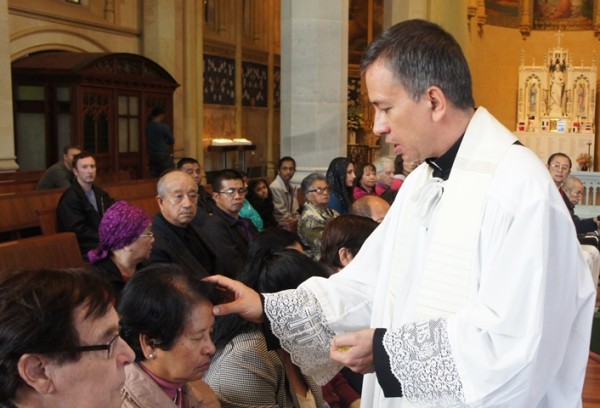Healing Mass and Anointing of the Sick
Healing Mass & Anointing of the Sick
St Mary’s Cathedral, Sunday 25th May 2014

Archbishop Costelloe led prayers for the sick and joined other clergy in praying over individuals for the Anointing of the Sick after a Mass of Healingin St Mary’s Cathedral on Sunday 25th May. Those in attendance were also offered a vial of holy water from the Marian Shrine in Lourdes, France to take away with them at the end of the service.
Below is the full text of the Archbishop’s homily:
On Tuesday of last week, 13th May, the Church throughout the world celebrated the liturgical commemoration of Our Lady of Fatima. It is a day which is often associated with the ministry of healing in the Church as is, of course, also the feast day of Our Lady of Lourdes which is celebrated in February.
Although we were not able to gather together on those occasions to remind ourselves of the healing ministry of our Church, we celebrated yesterday another very important feast of Our Lady, the feast of Mary, Help of Christians, and we have decided here in the Cathedral to take the opportunity provided by yesterday's feast to celebrate the gift of healing which Jesus shares with his Church, especially through the Sacrament of Anointing. After Mass this morning those who have come to the Cathedral to receive this Sacrament will remain behind as I and the priests administer this sacrament to those who are ill and in great need of the strength which this sacrament provides. Those of you who would like to support our sick brothers and sisters by your prayers and presence are very welcome to join us in prayer when I and the priests return to the sanctuary to administer this sacrament to them.
It is no accident of course that the tradition has grown in the Church of associating the ministry of healing with our belief in the importance of the Mother of the Lord in our lives of faith. We all know the story of the appearances of Mary to Saint Bernadette in Lourdes and we have all heard of the extraordinary ministry of healing which is now associated with Lourdes. In a way the title of yesterday's feast, Mary, Help of Christians, points us in the same direction. As the Lord was dying on the cross he gave his mother Mary to the Church, the community of his disciples, as both our mother and our helper. From the very beginning of the Christian story, when Mary gathered with the disciples to pray for the coming of the Holy Spirit which Jesus had promised to send, the Christian community has been conscious of her presence at the heart of our story, and of the support of her prayers as we seek to be faithful to God. How often has each of us prayed, over and over again, "Holy Mary, mother of God, pray for us sinners, now and at the hour of our death"? As Catholics we have a deep instinctive realisation that Mary does indeed accompany us with her presence and her support in our life-long journey of faith.
At the heart of Mary's role in the life of the Church, of course, is her insistence, which she first expressed to the stewards at the wedding feast at Cana, that we should do whatever he, Jesus, tells us. Mary will always point us to her Son and invite us to listen to him, learn from him, and follow him.
This is the heart of the Christian life for all of us, both when our lives are going well and when they are full of struggle and difficulty. In this morning's Mass, and in the celebration of the Anointing of the Sick which will follow Mass, we are focusing in particular on the struggles and difficulty, the challenges, associated with ill health. For those who are sick, and especially for those who are seriously or chronically ill, these challenges are very real. Alongside the pain and suffering caused by the illness itself, there is often the sense of powerlessness, the fear of what lies ahead, the loss of independence, and the shrinking of life's opportunities. Often too there is a sense of loneliness, isolation and sometimes even rejection. In the Catholic Catechism there is a very realistic assessment of these realities and of the danger they carry: illness, the Catechism tells us, can lead to anguish, self-absorption, sometimes even despair and revolt against God. But the Catechism reminds us that illness can also make people more mature, helping them to discern in their life what is not actually essential so that they can turn towards those things that are. Illness can in fact provoke a search for God and a return to God.
Along with the physical healing for which we pray in our times of illness and suffering, this is the true healing which we all need so much. It is one of the graces of the Sacrament of Anointing, as it is of all the sacraments. Saint Augustine once said that God has made us for himself, and we will always have restless hearts until our hearts rest in God.
This resting in God is the very gift which the Holy Sprit, promised to us by the Lord in today's gospel, offers to us. Our minds are beginning to turn now to the Feast of Pentecost when we celebrate the fulfilment of the Lord's promise to send us his Spirit. We will be reminded again that our God is a faithful God who always keeps his promises. During his life Jesus made another promise: come to me if you labour and are overburdened and I will give you rest. Take up my yoke and learn from me for I am meek and humble of heart and you will find rest for your souls. Yes, my yoke is easy and my burden light.
Our prayer today, for all our sick brothers and sisters, is that through the Sacrament of Anointing they will indeed be able to come to the Lord and receive the gift of peace, the gift of rest, which he promises to all who entrust themselves to him. We might say the same prayer for ourselves and each other, for we all have burdens to carry, difficulties to manage and challenges to contend with. May we all come to him and open ourselves to his gift of peace.
And may the prayers of Mary, mother of the Lord and our mother and helper, also be with us on this journey of faith. Holy Mary, mother of God, pray for us sinners now, and at the hour of our death.


